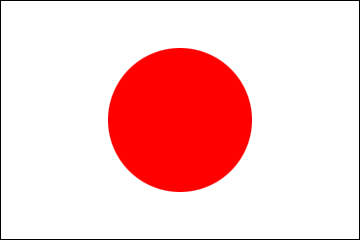Japan’s Grant Assistance to Malaysia through International Organisations for Prevention of Further Spread of the Novel Coronavirus Diseases (COVID-19)
2021/1/21
Since March 2020, Japan has been providing humanitarian assistance on grant basis to Malaysia through international organisations in the face of the threat of the Novel Coronavirus Diseases (COVID-19), in addition to bilateral cooperation with the Government of Malaysia.
[The International Federation of Red Cross and Red Crescent Societies (IFRC)]
Japan has contributed approximately 24 million USD for 27 countries in Asia, Middle East through the Office of the International Federation of Red Cross and Red Crescent Societies (IFRC). For Malaysia, 970 thousand USD has been utilized from March 2020, mainly for:
1) distributing food packages to 5,000 households and hygiene kits such as hand sanitizers to 3,000 households.
2) distributing personal protective equipment (PPE) such as surgical masks mostly to Sabah
3) procuring medical service vehicle and trucks for transportation
4) procuring negative pressure ambulance
5) procuring ICT equipment for the Malaysian Red Crescent Society (MRCS) to hold virtual meetings
6) providing education assistance such as remote learning (ongoing)
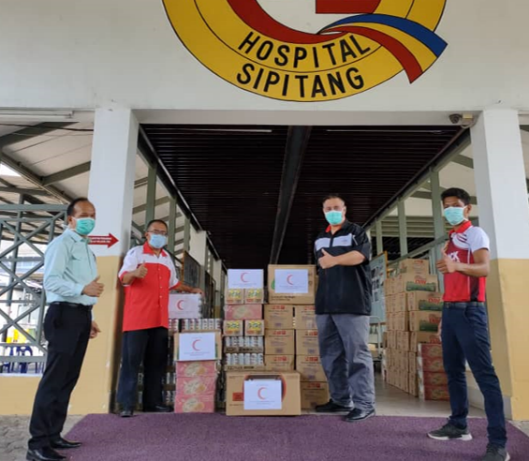
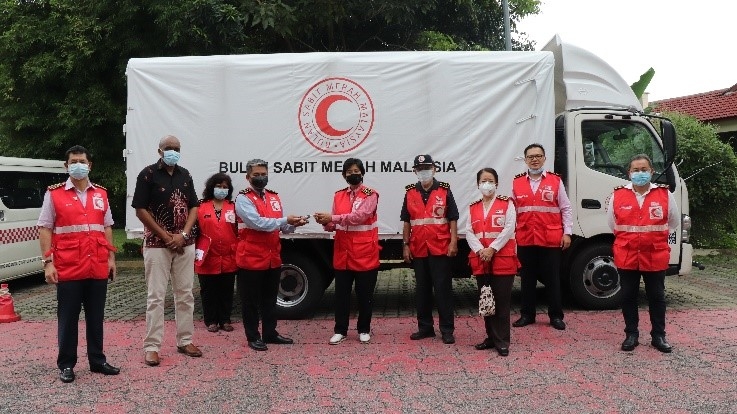
Handing over of supplies and procuring trucks (Photo: IFRC)
[the United Nations Children's Fund (UNICEF)]
Japan has contributed approximately 29 million USD for 26 countries in Asia, Middle East and Oceania through the Office of the United Nations Children's Fund (UNICEF). For Malaysia, approximately 220 thousand USD has been utilized from March to September 2020, mainly for:
1) procuring hygiene supplies such as face masks and hand sanitizers for 73,500 children of concern mostly in Klang valley and Sabah state.
2) engaging more than 390,000 young people with preventive information on COVID-19 through UNICEF Malaysia online platforms
3) providing support for such as training sessions to Ministry of Education and 2,627 school teachers in strengthening a platform for continuous remote learning
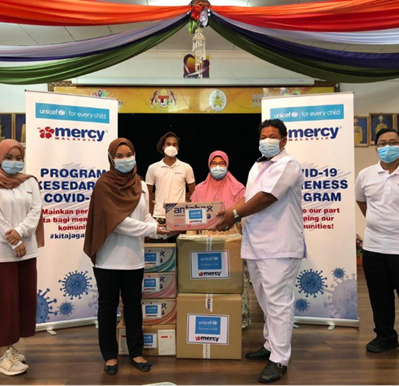
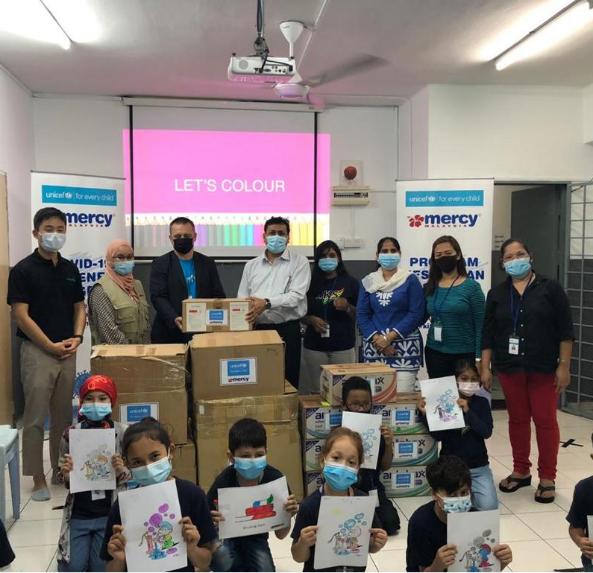
Handing over of supplies (Photos: UNICEF)
[the Office of the United Nations High Commissioner for Refugees (UNHCR)]
Japan has contributed approximately 24 million USD for 17 countries in Asia and Middle East through the Office of the United Nations High Commissioner for Refugees (UNHCR). For Malaysia, 1 million US Dollar has been utilized from March to September 2020, mainly for:
1) providing support for securing minimum daily necessities for highly vulnerable 4,273 households covering 14,506 persons in need
2) distributing food and hygiene supplies for 8,435 households in need
3) procuring PPEs, hand sanitisers, surgical masks, gloves and any other medical supplies necessary for the activities of UNHCR and partner organisations
4) procuring telecommunication equipment for UNHCR to provide remote services for persons in need
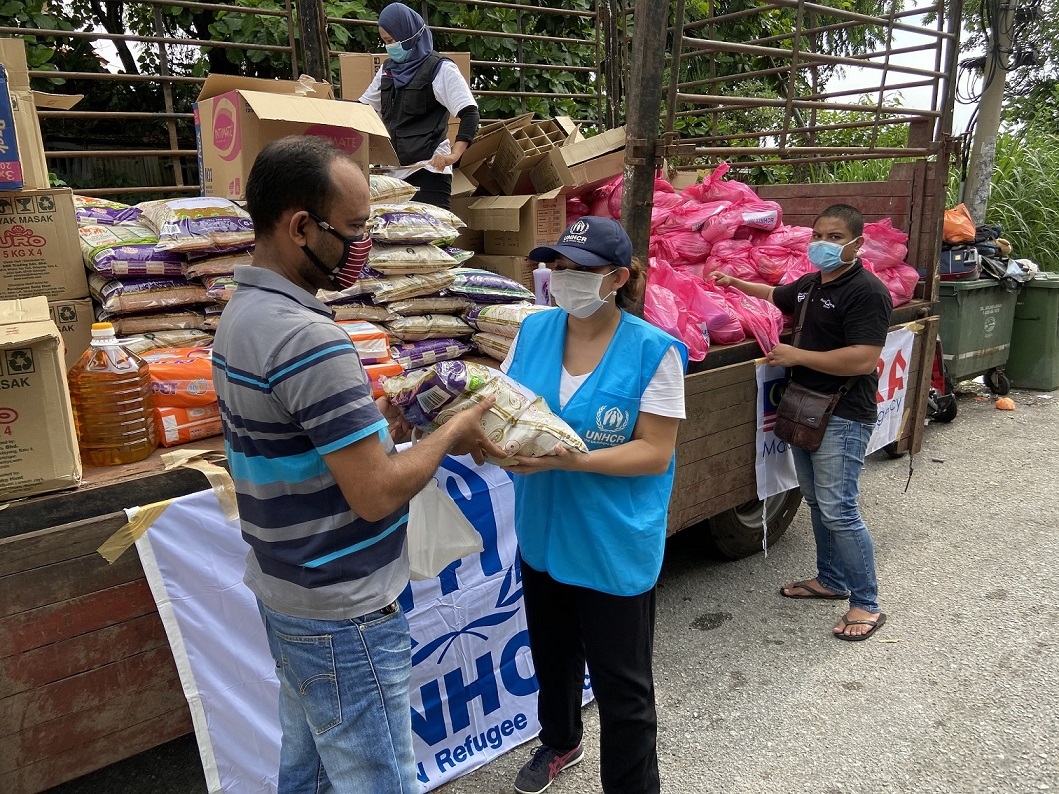
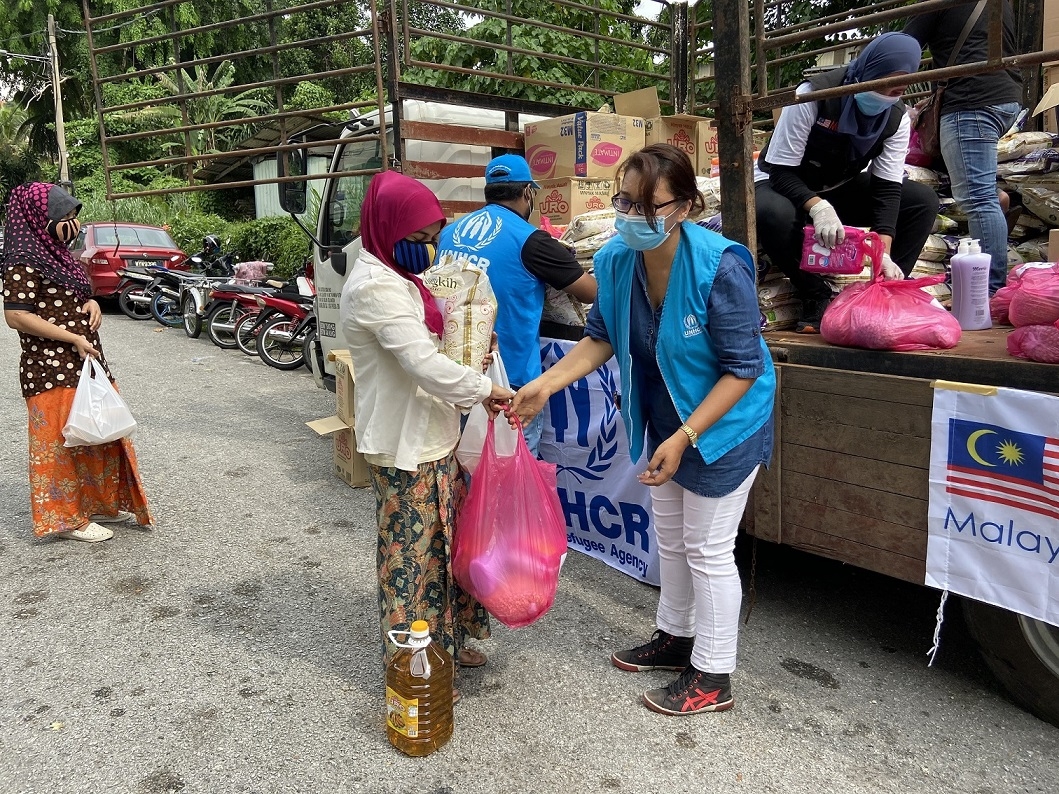
Handing over of supplies to persons in need (Photo: UNHCR)
Such assistance for vulnerable persons in need is in line with the concepts of ‘leave no one behind’ in the Sustainable Development Goals (SDGs) and securing ‘freedom from fear and freedom from want’ in Human Security, and the assistance contributes to maintaining people’s health and livelihood.
[The International Federation of Red Cross and Red Crescent Societies (IFRC)]
Japan has contributed approximately 24 million USD for 27 countries in Asia, Middle East through the Office of the International Federation of Red Cross and Red Crescent Societies (IFRC). For Malaysia, 970 thousand USD has been utilized from March 2020, mainly for:
1) distributing food packages to 5,000 households and hygiene kits such as hand sanitizers to 3,000 households.
2) distributing personal protective equipment (PPE) such as surgical masks mostly to Sabah
3) procuring medical service vehicle and trucks for transportation
4) procuring negative pressure ambulance
5) procuring ICT equipment for the Malaysian Red Crescent Society (MRCS) to hold virtual meetings
6) providing education assistance such as remote learning (ongoing)


Handing over of supplies and procuring trucks (Photo: IFRC)
[the United Nations Children's Fund (UNICEF)]
Japan has contributed approximately 29 million USD for 26 countries in Asia, Middle East and Oceania through the Office of the United Nations Children's Fund (UNICEF). For Malaysia, approximately 220 thousand USD has been utilized from March to September 2020, mainly for:
1) procuring hygiene supplies such as face masks and hand sanitizers for 73,500 children of concern mostly in Klang valley and Sabah state.
2) engaging more than 390,000 young people with preventive information on COVID-19 through UNICEF Malaysia online platforms
3) providing support for such as training sessions to Ministry of Education and 2,627 school teachers in strengthening a platform for continuous remote learning


Handing over of supplies (Photos: UNICEF)
[the Office of the United Nations High Commissioner for Refugees (UNHCR)]
Japan has contributed approximately 24 million USD for 17 countries in Asia and Middle East through the Office of the United Nations High Commissioner for Refugees (UNHCR). For Malaysia, 1 million US Dollar has been utilized from March to September 2020, mainly for:
1) providing support for securing minimum daily necessities for highly vulnerable 4,273 households covering 14,506 persons in need
2) distributing food and hygiene supplies for 8,435 households in need
3) procuring PPEs, hand sanitisers, surgical masks, gloves and any other medical supplies necessary for the activities of UNHCR and partner organisations
4) procuring telecommunication equipment for UNHCR to provide remote services for persons in need


Handing over of supplies to persons in need (Photo: UNHCR)
Such assistance for vulnerable persons in need is in line with the concepts of ‘leave no one behind’ in the Sustainable Development Goals (SDGs) and securing ‘freedom from fear and freedom from want’ in Human Security, and the assistance contributes to maintaining people’s health and livelihood.
